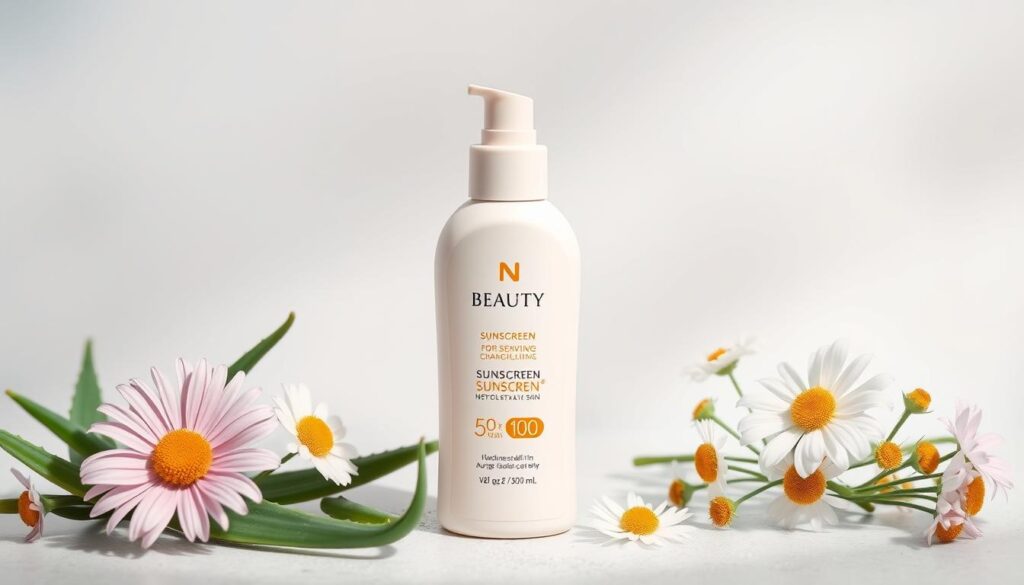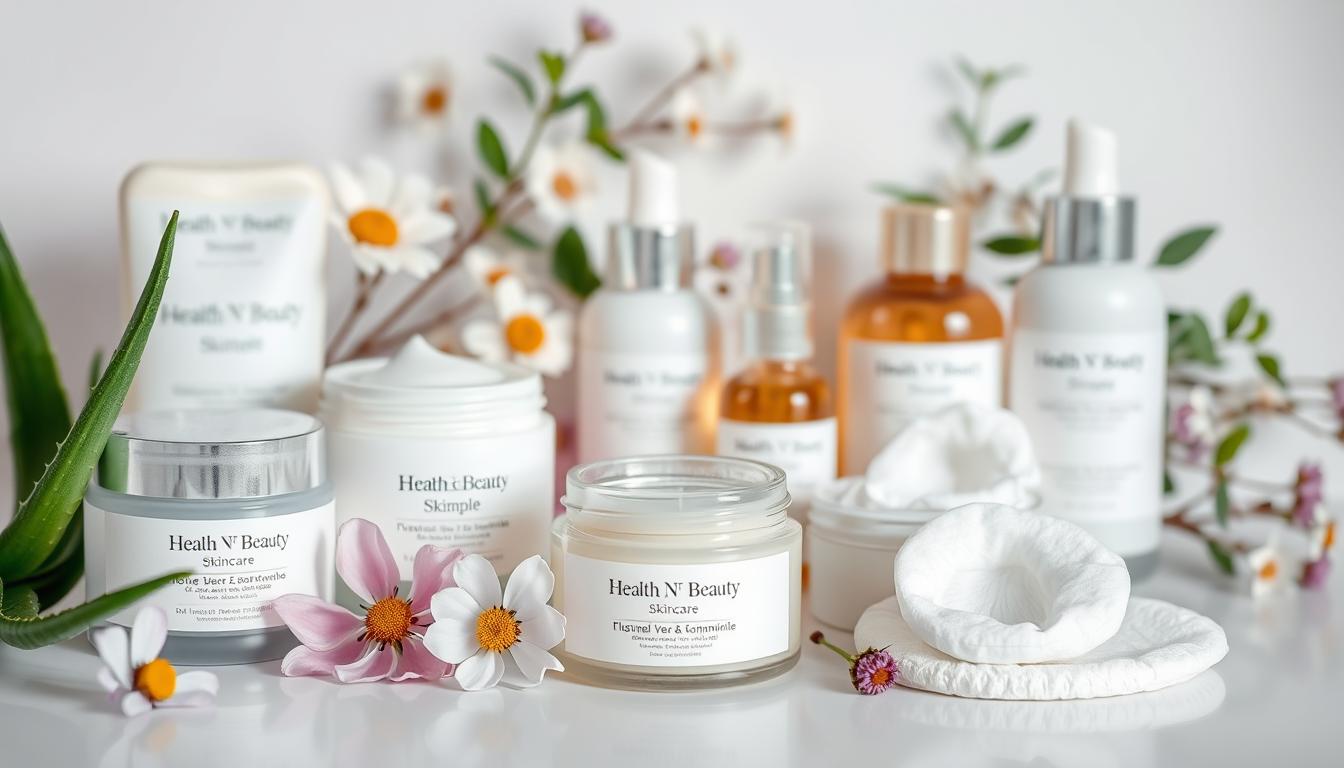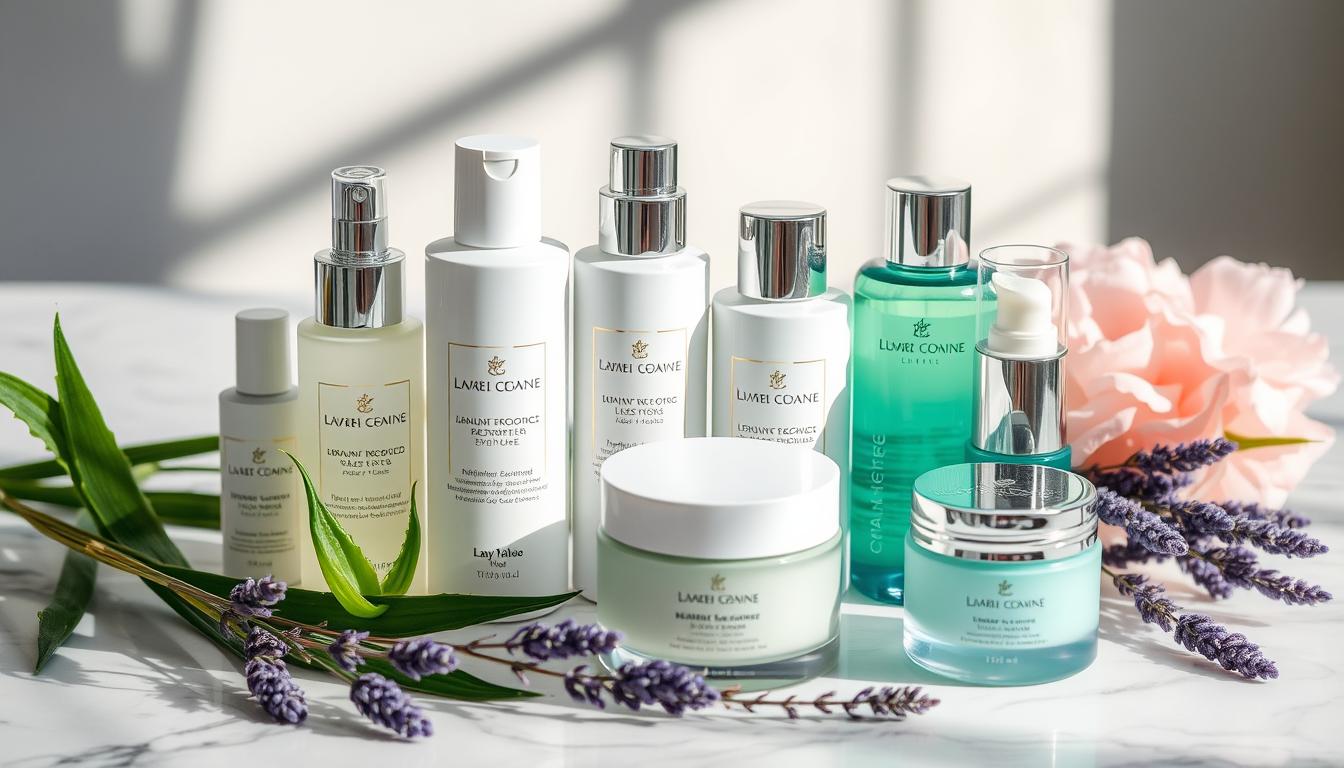Dealing with sensitive skin can be tough, but finding the right way can make a big difference. This guide will show you how to care for your skin gently. You’ll learn how to soothe and nourish it, helping you feel confident in your own skin.
If your skin gets red, irritated, or reacts easily, we’ve got you covered. We’ll dive into the science of sensitive skin. You’ll get the tools to make a skincare routine that works for you, bringing comfort and results.
Key Takeaways
- Understand the root causes and common triggers of sensitive skin
- Discover gentle cleansing methods to avoid further irritation
- Learn about hydrating and soothing moisturizers for sensitive complexions
- Identify and avoid harsh ingredients that can exacerbate sensitivity
- Protect your skin with the right sunscreen for sensitive skin
- Explore lifestyle tips and professional treatments to manage sensitive skin
- Develop a customized, gentle skincare routine that nourishes your complexion
Understanding Sensitive Skin
Sensitive skin is a common condition that can make your skin feel uncomfortable. It can cause redness and irritation. Let’s dive into what it is and what triggers and symptoms it has.
What is Sensitive Skin?
Sensitive skin reacts more easily to certain things. This can be due to a weak skin barrier. This makes your skin more sensitive and reactive.
There are many reasons why someone might have sensitive skin. Some common causes include:
- Genetic predisposition
- Damage to the skin barrier
- Exposure to harsh chemicals or irritants
- Underlying skin conditions like eczema or rosacea
- Stress and hormonal fluctuations
Common Triggers and Symptoms
People with sensitive skin often notice certain symptoms. These can include:
- Redness and flushing
- Stinging, burning, or itching
- Tightness or dryness
- Increased sensitivity to certain products or environmental factors
- Breakouts or acne-like eruptions
Some common things that can trigger sensitive skin include:
- Harsh cleansers or skincare products
- Extreme temperatures, wind, or sun exposure
- Certain ingredients like fragrances, preservatives, or alcohol
- Stress and hormonal changes
- Dietary factors like spicy or acidic foods
Knowing what triggers and symptoms your sensitive skin has is key. It helps you create a skincare routine that works for you.
Gentle Cleansing for Sensitive Skin
Proper cleansing is key for those with sensitive skin. Harsh products can make things worse. It’s important to choose gentle, non-irritating cleansers that clean well without taking away the skin’s natural oils.
For sensitive skin, a gentle touch is needed. The right gentle cleansers for sensitive skin can greatly improve your skin’s health. Look for sensitive skin cleansing products without fragrances, alcohol, or harsh surfactants.
Finding the right sensitive skin face wash is crucial. It should clean gently without harming the skin’s natural barrier. Choose creamy, moisturizing cleansers with mild surfactants like glycerin or oils. They help remove dirt without drying or irritating the skin.
| Ingredient | Benefits for Sensitive Skin |
|---|---|
| Aloe Vera | Soothes and calms irritation |
| Ceramides | Strengthens the skin’s natural barrier |
| Hyaluronic Acid | Deeply hydrates and plumps the skin |
Using a gentle, non-irritating cleanser daily can help keep your skin healthy and comfortable. It’s a great start to your sensitive skin care routine.
Hydrating and Soothing Moisturizers
Keeping your skin well-hydrated is crucial for sensitive skin. Look for moisturizers that nourish and soothe. We’ll look at important ingredients and how to pick the best moisturizer for you.
Key Ingredients for Sensitive Skin
For sensitive skin, the best moisturizing ingredients are:
- Ceramides – These lipids strengthen the skin’s barrier and keep moisture in.
- Hyaluronic Acid – A humectant that hydrates deeply without being greasy.
- Glycerin – A gentle ingredient that binds moisture and softens the skin.
- Squalane – A natural emollient that nourishes without clogging pores.
- Colloidal Oatmeal – Soothes and reduces inflammation, calming redness and irritation.
Choosing the Right Moisturizer
When picking a moisturizer for sensitive skin, keep these tips in mind:
- Choose fragrance-free and dye-free formulas to avoid irritants.
- Look for “non-comedogenic” moisturizers to avoid clogged pores.
- Pick a texture that fits your skin type – light lotions for oily skin, rich creams for dry skin.
- Introduce new products slowly to avoid irritation.
- Consider adding a hydrating serum under your moisturizer for extra nourishment.
By choosing moisturizers with gentle ingredients and finding the right fit for your skin, you can get the hydration and comfort your sensitive skin needs.
Avoiding Harsh Ingredients and Irritants
Choosing the right skincare ingredients is key for sensitive skin. Some products can make irritation worse. It’s smart to avoid harsh chemicals and irritants to keep your skin healthy and glowing.
Fragrance is a big no-no. Synthetic fragrances can cause allergic reactions, leading to redness and inflammation. Always choose fragrance-free products to avoid irritation.
- Alcohol can dry out and irritate sensitive skin. Look for products without alcohol to keep your skin hydrated.
- Parabens and sulfates are harsh preservatives that can upset your skin’s balance. Instead, opt for gentle, sensitive skin-friendly ingredients.
By picking the right skincare products and avoiding common irritants for sensitive skin, you can keep your skin healthy and radiant. Remember, sensitive skin likes simple and gentle routines.
“The key to managing sensitive skin is being mindful of the ingredients to avoid for sensitive skin and choosing soothing, nourishing formulas.”
With the right attention and ingredients to avoid for sensitive skin, you can get a balanced, comfortable complexion. This will make you glow with confidence.
Sensitive Skin Care: Gentle Solutions for Comfort
Caring for sensitive skin needs a gentle touch. Finding the right sensitive skin care routine is crucial for comfort and glow. Using gentle skincare for sensitive skin and soothing skincare products helps nourish and protect your skin. It also reduces irritation and brings back your skin’s natural balance.
Creating a successful sensitive skin care routine starts with knowing your skin. You might need to try different cleansers, moisturizers, and products. This helps find the perfect mix that calms and hydrates your skin without causing problems.
| Sensitive Skin Concern | Recommended Ingredients |
|---|---|
| Redness and Inflammation | Aloe vera, green tea, ceramides |
| Dryness and Dehydration | Hyaluronic acid, glycerin, niacinamide |
| Irritation and Sensitivity | Chamomile, oatmeal, squalane |
Adding these gentle skincare for sensitive skin and soothing skincare products to your routine can soothe and nourish your skin. This provides the comfort and protection it needs.
“Caring for sensitive skin is a journey of self-discovery, where every step towards finding the right products and routine can make a world of difference in your skin’s health and comfort.”
Remember, sticking to a consistent and thoughtful sensitive skin care routine is essential. It helps manage your skin’s unique needs and keeps your skin healthy and radiant.
Sunscreen for Sensitive Skin
It’s important to protect your sensitive skin from the sun’s harmful UV rays. But, finding the right sunscreen for sensitive skin can be hard. You need to pick a sensitive skin safe sunscreen that protects well without causing irritation.
Choosing the Right Sunscreen
When picking a sunscreen for sensitive skin, think about these things:
- Mineral-based sunscreens: Go for sunscreens with zinc oxide or titanium dioxide. These physical blockers are gentler on sensitive skin than chemical sunscreens.
- Fragrance-free and hypoallergenic: Stay away from sunscreens with added fragrances or harsh chemicals. They can irritate sensitive skin more.
- Water-resistant: Choose a water-resistant sunscreen. This ensures sun protection for sensitive skin stays effective, even when sweating or swimming.
- SPF 30 or higher: Pick a sunscreen with an SPF of 30 or higher. This offers enough protection from UVA and UVB rays.
| Sunscreen Ingredient | Sensitivity Rating |
|---|---|
| Zinc Oxide | Low Sensitivity |
| Titanium Dioxide | Low Sensitivity |
| Avobenzone | Moderate Sensitivity |
| Oxybenzone | High Sensitivity |
By keeping these tips in mind, you can find a sunscreen for sensitive skin. It will give you the sun protection for sensitive skin you need without causing irritation or discomfort.

“Protecting your skin from the sun is essential, but it’s crucial to choose a sunscreen that won’t cause more harm than good for those with sensitive skin.”
Lifestyle Tips for Managing Sensitive Skin
Keeping a healthy lifestyle for sensitive skin is key to handling the discomfort and irritation. It’s not just about a good sensitive skin care routine. There are many practical steps to take to reduce flare-ups and keep your skin smooth and comfortable.
One important thing is to tackle environmental stressors that can upset sensitive skin. This includes:
- Limiting exposure to harsh weather conditions, such as extreme heat, cold, or wind
- Protecting your skin from UV rays by wearing protective clothing and using a gentle, sensitive skin-friendly sunscreen
- Avoiding harsh chemicals, fragrances, and other potential irritants in household products and personal care items
What you eat also affects your skin. Eating foods that fight inflammation, like omega-3 fish, leafy greens, and fruits and veggies full of antioxidants, can help soothe your skin. Drinking plenty of water and avoiding spicy or acidic foods can also help a lot.
Lastly, managing stress is crucial for a healthy, balanced complexion. Activities like meditation, yoga, and deep breathing can help lower inflammation and reduce stress’s impact on your skin.
| Lifestyle Factor | Sensitive Skin Considerations |
|---|---|
| Environment | Limit exposure to harsh weather, use gentle sun protection, avoid harsh chemicals |
| Diet | Incorporate anti-inflammatory foods, stay hydrated, limit potential triggers |
| Stress Management | Practice relaxation techniques to reduce inflammation and skin irritation |
By focusing on these lifestyle aspects, you can manage your sensitive skin in a holistic way. This will help you enjoy a more comfortable and confident complexion.
Sensitive Skin and Makeup
Dealing with makeup can be tough for those with sensitive skin. But, the right products and approach can help. We’ll look at makeup for sensitive skin, helping you find what works best for you.
Makeup Products for Sensitive Skin
For makeup for sensitive skin, choose products without harsh chemicals or fragrances. Here are some sensitive skin friendly makeup options:
- Mineral-based foundations and powders: These are gentle and less likely to irritate.
- Hypoallergenic and non-comedogenic concealers: Great for cosmetics for sensitive skin as they don’t clog pores.
- Cream-based blush and eyeshadows: Smooth and won’t tug or irritate.
- Fragrance-free and non-irritating mascara and eyeliners: Gentle for sensitive eyes.
Choosing the right sensitive skin friendly makeup lets you look good without hurting your skin.
“The key to finding the right makeup for sensitive skin is to read the labels carefully and look for products that are free of common irritants like fragrance, alcohol, and harsh preservatives.”
| Product | Key Ingredients | Benefits for Sensitive Skin |
|---|---|---|
| Mineral Powder Foundation | Titanium Dioxide, Zinc Oxide | Non-comedogenic, Calming, Protects from sun exposure |
| Hypoallergenic Concealer | Aloe Vera, Vitamin E | Hydrating, Soothing, Reduces redness and inflammation |
| Cream Blush | Shea Butter, Jojoba Oil | Nourishing, Enhances glow without irritation |
Professional Treatments for Sensitive Skin
For those with sensitive skin, professional treatments offer gentle yet effective solutions. These procedures are designed for sensitive skin, helping to achieve a healthier look. They make your skin feel more comfortable.
Experienced dermatologists and estheticians know how to handle sensitive skin. They suggest treatments that gently fix various skin issues without causing more irritation.
- Gentle facials: Customized facial treatments that use soothing, non-irritating ingredients to cleanse, exfoliate, and hydrate sensitive skin.
- Specialized peels: Gentle chemical peels that utilize mild acids to improve texture and tone without causing excessive dryness or redness.
- Laser therapies: Advanced laser treatments that target specific skin concerns, such as redness or uneven pigmentation, while minimizing discomfort for sensitive skin types.
When looking into professional treatments for sensitive skin, it’s key to work with a dermatologist or a skilled skincare specialist. They can create a plan that meets your needs. This plan helps fix your skin concerns without harming your sensitive skin.
“The key to successful professional treatments for sensitive skin is finding the right balance between effective results and gentle, non-irritating methods.”
Adding professional treatments to your sensitive skin care routine can lead to a brighter, more comfortable complexion. With expert guidance, you can tackle persistent skin issues effectively.

At-Home Remedies and Natural Solutions
There are many ways to soothe sensitive skin at home. You can use natural solutions that are easy to add to your daily routine. These DIY remedies can calm irritated skin.
DIY Remedies for Sensitive Skin
Making your own skincare products is a good way to care for sensitive skin. Here are some DIY options:
- Hydrating face masks with aloe vera, honey, and oatmeal to soothe and hydrate.
- Calming essential oils like chamomile, lavender, or rosemary in a carrier oil for a relaxing facial massage.
- Gentle cleansing grains or powders with rice, chickpea, or jojoba to cleanse without stripping the skin.
- Homemade toners with rosewater, green tea, or cucumber to balance and refresh the complexion.
These natural remedies can help restore moisture, reduce inflammation, and calm the skin. They offer a soothing alternative to harsher products. Try different ingredients to find what works best for your sensitive skin.
“Incorporating natural, gentle ingredients into your skincare routine can be a game-changer for managing sensitive skin.”
By focusing on nourishing, soothing, and calming the skin, you can create a personalized at-home regimen. This addresses your specific concerns and promotes long-term skin health. Embrace the power of natural remedies for sensitive skin, home remedies for sensitive skin, and DIY sensitive skin care to find the relief and comfort your skin deserves.
Building a Gentle Skincare Routine
Creating a skincare routine for sensitive skin is about finding the right balance. It’s about effective cleansing, nourishing hydration, and gentle protection. By addressing sensitive skin’s unique needs, you can create a customized regimen. This regimen soothes, calms, and promotes a healthier-looking complexion.
Begin your day with a sensitive skin care routine that gently cleanses. Choose non-foaming, fragrance-free cleansers that avoid harsh chemicals. Then, apply a hydrating, soothing moisturizer with calming ingredients like aloe vera, ceramides, or green tea.
In the evening, remove makeup and impurities with a creamy, non-irritating makeup remover or cleansing balm. This step prepares your skin for the next phase of your skincare routine for sensitive skin. Finish with a rich, replenishing moisturizer to lock in hydration and support the skin’s natural barrier.
Remember, sun protection is key! Choose a broad-spectrum, mineral-based sunscreen with an SPF of 30 or higher. Opt for formulas without fragrances, alcohol, and other potential irritants.
By customizing a skincare routine for sensitive skin and following these gentle, nourishing steps, you can enjoy a complexion that is soothed, comforted, and radiant.
| Skincare Step | Recommended Ingredients |
|---|---|
| Cleanse | Non-foaming, fragrance-free, sulfate-free |
| Moisturize | Aloe vera, ceramides, green tea |
| Sunscreen | Mineral-based, SPF 30 or higher, fragrance-free |
Conclusion
We’ve covered a lot about caring for sensitive skin in this guide. We talked about the need for gentle cleansing and hydration. We also discussed avoiding harsh ingredients and irritants.
Understanding sensitive skin’s unique needs is key. This lets us create a skincare routine that makes our skin comfortable, healthy, and radiant.
The main points from our journey are important. Listen to your skin and try gentle, hypoallergenic products. Also, stick to a consistent, customized skincare routine.
Remember, what works for one person might not work for another. Being open-minded and adaptable helps you find the right products and techniques for your skin.
Keep learning and seeking advice as you care for your sensitive skin. Trying new, gentle solutions is okay. With the right approach, you can have a glowing complexion that boosts your confidence.
Embrace the world of sensitive skin care. It offers many ways to soothe and care for your skin.
FAQ
What is sensitive skin?
Sensitive skin gets easily irritated, red, and uncomfortable. This happens due to many things like the environment, certain ingredients, and lifestyle choices.
What are the common symptoms of sensitive skin?
Signs of sensitive skin include redness, stinging, and itching. It can also feel dry and react to some products or conditions.
What are the main causes of sensitive skin?
Sensitive skin can come from genetics or a weak skin barrier. It’s also caused by certain ingredients, stress, and skin conditions.
How do I choose a gentle cleanser for sensitive skin?
Choose a cleanser that’s non-foaming, fragrance-free, and pH-balanced. It should be made for sensitive skin. Avoid alcohol, sulfates, and harsh surfactants.
What are the key ingredients to look for in a moisturizer for sensitive skin?
Look for moisturizers with ceramides, hyaluronic acid, and glycerin. Also, aloe vera, chamomile, and green tea are good for soothing.
What ingredients should I avoid in sensitive skin care products?
Avoid fragrances, alcohol, retinoids, and exfoliating acids in sensitive skin care. Also, steer clear of parabens and formaldehyde.
How do I choose a sunscreen that won’t irritate my sensitive skin?
Opt for mineral-based sunscreens with zinc oxide or titanium dioxide. Avoid chemical sunscreens, as they can irritate.
What lifestyle factors can affect sensitive skin?
Stress, diet, and the environment can affect sensitive skin. Reducing stress, eating well, and protecting yourself can help.
How can I incorporate makeup into my sensitive skin care routine?
Pick makeup that’s non-comedogenic and fragrance-free. Look for “sensitive skin” or “hypoallergenic” labels. Start simple and test new products first.
What professional treatments are available for sensitive skin?
There are gentle facials, special chemical peels, and laser therapies for sensitive skin. They can be part of a full skincare plan.
What are some effective at-home remedies for sensitive skin?
Use aloe vera, honey, chamomile, and oatmeal in DIY face masks. They can soothe and hydrate your skin.




What a lovely article. I have never read such amazing article on this topic before. Very helpful.
Thank You